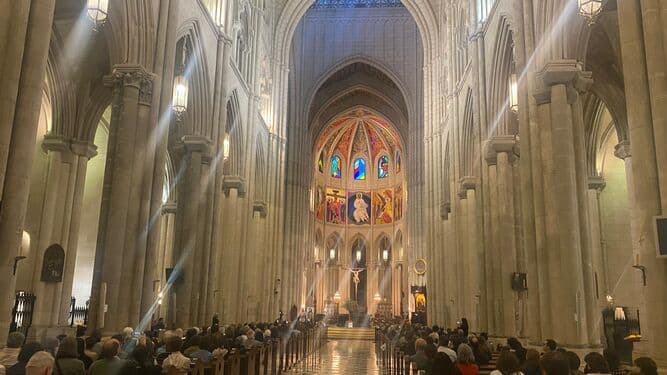MADRID – “When I was 14 years old, I was forced to go to a religious club meeting. I had to call my parents in front of a priest, who monitored what I had to say to them in order to get permission. Even then, I was brutally pressured in a planned way by the people who spoke to me to join the organization, under the threat of eternal damnation if I didn’t…they forced me to hide my entry from my parents.”
Héctor (not his real name) was one of the ten testimonies heard Monday in the portico of the cathedral of La Almudena, next to the statue of John Paul II, in an Act of Reparation for the victims that brought together hundreds of people in the diocesan temple of Madrid before a deafening silence, which shook the stones of the cathedral.
Men and women who were sexually, physically and emotionally abused by priests, men and women religious and pastoral workers, by ecclesiastical institutions, many of them as children, and who were met with the silence and the complicit coverup by the institution, which until very recently continued looking the other way.
Today, it seems, things are starting to change. But the voice of the victims had not been heard, at least not until now. They still do not sit on an equal footing at the tables where decisions are made regarding their future. But Monday’s decision, promoted by Cardinal José Cobo Cano of Madrid, represents a first step. Important, in the symbolic sense. Hopeful, with many cautions, in regards to the victims.
“They gave me education and culture, but they stole my soul. Since it happened, more than 40 years ago, I am not afraid of death, but of life,” recalled a man who was abused as a child at school.
“If there are no more complaints, it is not because there was no abuse, it is because the treatment that we are going to receive is more painful than the abuse itself,” added a priest, who was abused while in seminary.
Not all of those who spoke corresponded with the story given, in order to preserve the privacy of the survivors, many of whom have not yet been able to confront their abuser.
“You are a victim and, at the same time, you consider yourself an accomplice, and you feel disgusted with yourself,” said one woman who was abused by her novitiate master, while another, who is a nun today, recalled the abuse she suffered for ten years at the hands of her confessor.
“It wasn’t just one person who abused me, it’s an entire community that allowed it,” said another victim. “The reason there are ‘bad guys’ in the church is that there are good guys who don’t denounce the bad ones. What harms the church is not the complaint, but what happens with it.”
“The bad ones win when the good ones do nothing,” the victim said, with the raw truth of their testimony.
Others called on the church to react.
“Do not be afraid of the victims. Most of us are not looking to publicize our case or see how we can get a financial pinch from the church. We only need to be welcomed…We have been betrayed by the church,” said another man, who was abused as an adult during a pilgrimage.
“The institution has almost done me more harm than the aggressor. It took them 10 years to receive me and believe me…The dilettante, distant, legalistic and cold attitude of some ecclesiastics and individuals who covered up have greatly damaged my relationship with God,” concluded an adult woman, the victim of a priest, before the moment of contemplation and request for forgiveness by Cobo and the REPARA project, which invited the church and victims “to begin together paths of listening and healing.”
“At the doors of this temple, with the survivors, the church in Madrid wants to get going. We want to assume the blame that corresponds to us and walk, together with the whole of society, assuming so much pain, without fear and with hope,” they said, before victims who wished to enter the cathedral for a penitential act, in which Cobo pronounced a resounding request for forgiveness, and a commitment to support the survivors of this scourge.
This article appeared in Spanish on Oct. 21 in Religión Digital.















